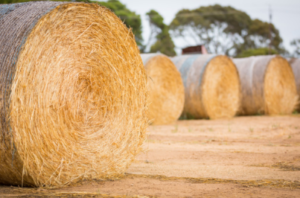Baler twine is used to quickly compact bundles of straw, hay or other fibrous material for easier storage and transport. Synthetic fiber baler twine can be made of either sisal or synthetic materials for optimal results.
Best-quality twines are constructed of tough polypropylene fiber with a flexible construction that fits well into baling machinery. These twines boast an exceptional knot-holding capacity and great durability and are treated to resist rot, mildew, rodents and insects.
High Strength
Synthetic fiber baler twine offers an alternative to sisal twine, which is susceptible to rot and mildew growth; its tough yet soft construction makes it easy to handle, running smoothly through baling machines.
 Initial raw materials are fed through an extruder to melt, forming a polypropylene (PP) film strip cut into different-width strips.
Initial raw materials are fed through an extruder to melt, forming a polypropylene (PP) film strip cut into different-width strips.
High Knot Holding Capacity
Twine made entirely from synthetic fibers can be fragile at their knots, which makes them unsuitable for use in balers or binders. As bales become ever more compressed, stronger bale twine will be necessary to withstand increased pressure.
Quality twine will feature high resistance to knotting and winding capabilities that help maximise space within a baler. Furthermore, its colour and UV protection will suit its environment of use.
Synthetic fiber baler twine comprises durable polypropylene fibers woven together to form a soft construction for maximum ease in balers while still being tough enough to withstand machinery and hands without wearing out easily. Furthermore, this twine has been treated to resist rot, mildew and rodent infestation and offers many colours to meet all your baling needs.
High Durability
Durability is at the core of baler twine performance. Our twine is constructed from tough polypropylene fiber with soft construction and UV inhibitors for added UV protection and is resistant to rot, mildew and rodent infestation. Plus, its use makes machinery work seamlessly – including all square balers!
Twine or net wrap binding options for bales of hay and straw typically depend on the kind of baler used and the forage being bound, as determined by either forage type or baler type. Although twine generally is the go-to binding choice, more modern balers now feature net wrap capabilities as well, giving producers flexibility in terms of forage type, location storage plans (indoor vs outdoor storage plans), and desired binding type based on forage, location or storage needs (indoor or outdoor).
Low Moisture Content
Twine made of natural or synthetic fibres can bind harvested crops together into a bundle, known as a bale, that is then mechanically compressed by balers into either a square or round shape before being tied with a knot to secure it together.
Inorganic lubricants like graphite and talc are typically preferred; however, some manufacturers also utilise mineral oils and polyglycols with UV inhibitors as alternatives. Furthermore, baling machines often feature black-coloured coatings designed to complement them perfectly, as well as treatments to ward off rodents and insects.
Low Weight
Synthetic baler twine is lighter than its natural counterpart, lowering storage and transportation costs and increasing storage efficiency. Furthermore, the material is biodegradable and nonpolluting, making it eco-friendly.
Some farmers use baler twine not only to pack hay and straw bales but also as an economical replacement for metal wire fencing, providing their livestock shelter without risk from loose wires. Furthermore, baler twine is great for repairing broken pieces of fencing as well as retiring existing pieces – not to mention the wide variety of colours that come with it!
If you need a good supply of hay baling twine, browse the selection at Northwest-owned and operated Coastal. We carry all of the sizes you need, from a small package to a large box. We also offer the accessories you need to make your hay baling job more productive, including net wrap and tarps. Some of our tarps are treated to resist mildew, rot and insects, so you can keep your hay feed clean, safe and dry. Our tarps are ideal for hay or straw bales, and they’re available in a variety of colours, so you can choose one that matches your equipment.
